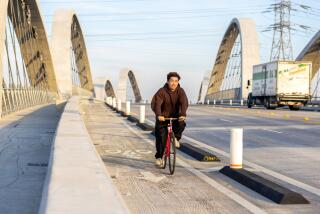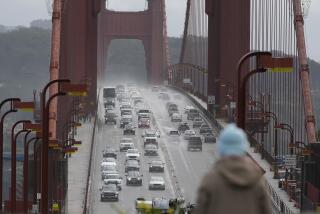Editorial: Drivers, start your eyeballs, the three-foot rule for cyclists is here
A California law requiring drivers to maintain a distance of three feet when passing cyclists on the road goes into effect next week. The Three Feet for Safety Act, passed last year by the Legislature, is the latest sign of an important cultural shift in a state famously dominated by automobiles.
The building of a bike-friendly society is a long, slow process. Officials in Los Angeles are in the midst of a 35-year project to build out 1,684 miles of bikeways. But as more people opt to get out of their cars and onto their bicycles, it is increasingly important to figure out how motorists and cyclists can share the road safely.
Hence the new law. Initially, its specificity is bound to cause some confusion and frustration among drivers and bicyclists alike. How exactly does a driver know whether he’s three feet away from a cyclist? What if moving three feet to the left means going into the oncoming traffic lane? Will some cyclists really carry yardsticks, as they have vowed to do, to make sure the law’s requirements are being met?
But drivers will figure it out. Laws similar to this one are already on the books in 22 states. The California Department of Motor Vehicles has long instructed drivers to pass at a safe distance and has recommended three feet. Now it’s the rule. However, the new law also states that if a driver is unable to give a cyclist three feet, due to traffic or road conditions (including the weather and width of the highway), the driver must instead slow to a reasonable speed and pass when doing so would not endanger the bicyclist. A violation carries a base fine of $35, unless the violation causes a collision and injury to the bicyclist. Then the fine is $220.
The law is a smart first step toward rational road-sharing, and it’s imperative that motorists — and, just as important, law enforcement agencies — take it seriously. Los Angeles police and California Highway Patrol officials have said that the emphasis in the first few months will be to educate drivers on the law, not necessarily to write a lot of tickets. That’s fine. But eventually drivers will have to be held accountable for careless or reckless passing. Likewise, cyclists also need to be held accountable when they break the rules of the road.
Virtually every urban bicyclist has a story about a driver who whizzed by too closely. If we want to coax more people out of their gas-guzzling cars, they have to feel confident that riding a bike is not a death-defying experience.
Follow the Opinion section on Twitter @latimesopinion
More to Read
A cure for the common opinion
Get thought-provoking perspectives with our weekly newsletter.
You may occasionally receive promotional content from the Los Angeles Times.










